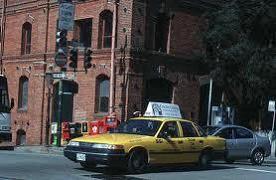Five cab drivers have filed a lawsuit against the San Francisco Municipal Transportation Agency, arguing that the agency’s sale of taxi permits should legally be considered a tax and that the agency’s so-called Taxi Medallion Sales Pilot Program is invalid without the approval of two-thirds of the voters.
The pilot program was put in place in part to help close the city’s $483 million dollar deficit.
San Francisco taxi drivers need permits, called medallions, to place a vehicle in operation as a cab. Medallion owners can lease the permits to other drivers when they’re not in the car. But it isn’t that easy to get a medallion; only a limited number are available.
Before the Pilot Program was initiated on February 26, taxi drivers who met eligibility requirements to receive a medallion (including a full-time driving requirement) had to put their names on a waiting list. The mediallions cost nothing but a modest processing fee — but the average wait time was 15 years and there were 3,200 names on the waiting list before MTA closed it in December of last year.
The pilot program changes who gets priority in receiving a medallion. Essentially, the city’s going to begin selling them off — not necessarily to the people on the top of the list but to people who can afford the set price of $250,000. As many as 60 medallions will be sold, with 20 percent of the revenuegoing to the city, 15 percent to the MTA and five percent to a fund for driver welfare.
Drivers at the top of the list will get first shot at coming up with a down payment of $12,500, but if they don’t have the cash, others will get a chance.
The lawsuit, Willaim D. Pallas vs. SFMTA and City and County of San Francisco, states that the pilot program should be abolished on the grounds that the revenue from medallion sales far exceeds the operating costs of the program – and is thus considered a tax – and that this “tax” should have been approved by voters before the program was even implemented.
“The persons with money, which aren’t most cab drivers, will dominate the cab industry if this program continues,” plaintiff attorney George Surmaitis told the Guardian, “And the people who have put in the work and sweat to obtain a better life will just stay where they are on the waiting list.”
Deputy City Attorney Wayne Snodgrass didn’t return calls by press time.
According to the MTA pilot program proposal document, the program has its benefits of allowing its drivers who are 70 years or older to retire and sell their medallions, thus increasing public safety.
Surmaitis isn’t convinced. “It’s a response to the budget cuts and it’s an attempt to raise money very quickly without considering the impact on individuals,” he said.
The pilot program impacts individuals such as plaintiff Gerson Garcia, who has been a cab driver for 19 years and has been on the wait list for more than 10 years. “We’ve been waiting for like 10 to 15 years to follow the system they have implemented and now they want to change it because the city needs money,” Garcia told us, “I used to be the manager of taxi dispatch at the San Francisco Airport. I gave up that job in 2008 and became a full-time taxi driver because I wanted to qualify for the medallion.”
The other four plaintiffs in the lawsuit have been taxi drivers for 16 to 29 years and have been on the wait list an average of 13 years, with most of them turning down other job opportunities and hoping that the extra income from receiving a medallion would help them in retirement. None of these taxi drivers can afford to pay for a medallion and years of waiting will come to naught if the Pilot Program continues.
The city filed its answer to the lawsuit on July 21, denying the allegations. The plaintiffs in the case plan to have a writ asking the court to put a halt on the sale of medallions sometime before medallion sales are scheduled to start on August 3.

